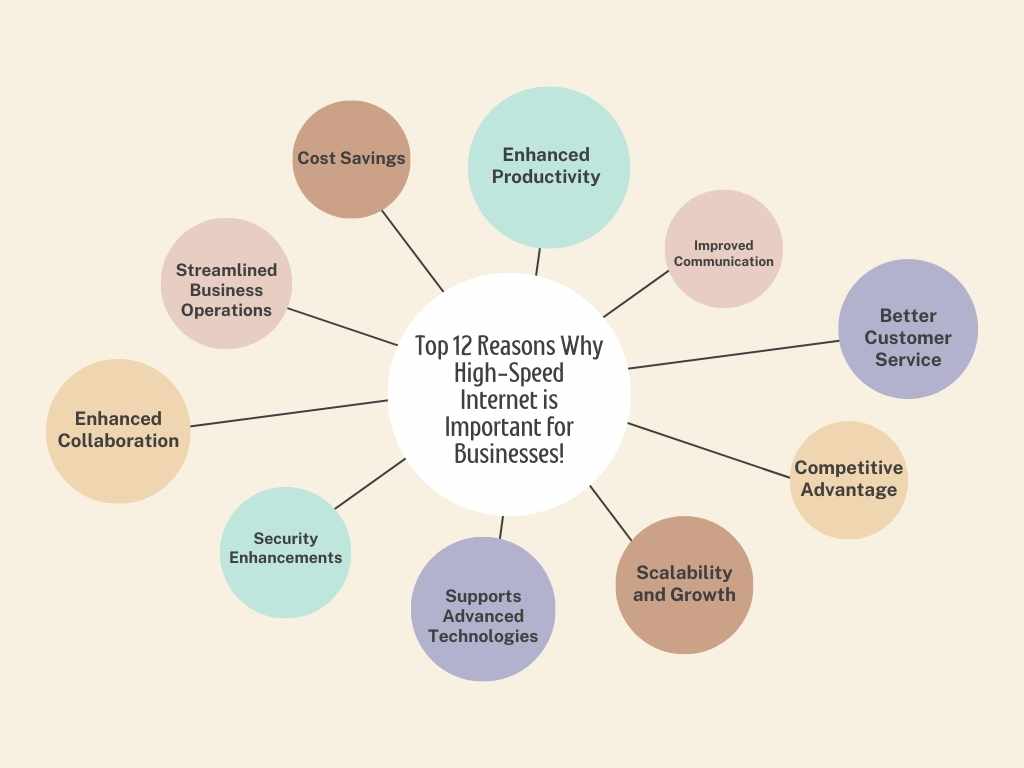In today’s fast-paced digital landscape, the importance of high-speed internet for business cannot be overstated. Whether you’re a startup, a small enterprise, or a multinational corporation, the speed and reliability of your internet connection play a crucial role in your daily operations and overall success.
From enhancing productivity to improving customer service, high-speed internet has become a fundamental necessity for businesses striving to stay competitive in the modern market.
In this blog, we will explore the myriad ways in which high-speed internet can transform your business, providing you with the tools and insights needed to thrive in an increasingly connected world.
Top 12 Reasons Why High-Speed Internet is Important for Businesses

In the digital era, the speed and reliability of your internet connection can make or break your business. Here are several compelling reasons for why importance of high-speed internet for business:
1. Enhanced Productivity
The importance of high-speed internet for business significantly boosts productivity by enabling employees to perform tasks more efficiently. Slow internet can cause frustrating delays in downloading and uploading files, accessing cloud-based applications, and communicating with colleagues and clients. With high-speed internet, these tasks are completed swiftly, allowing employees to focus on their core responsibilities and reduce downtime.
2. Improved Communication
Seamless communication is vital for any business. The importance of high-speed internet for business ensures smooth and uninterrupted video conferences, VoIP calls, and real-time collaboration tools. This is particularly important for businesses with remote teams or global clients, where clear and consistent communication is crucial for maintaining strong relationships and ensuring projects stay on track.
3. Better Customer Service
In today’s competitive market, excellent customer service can set your business apart. The importance of high-speed internet for business enables quick response times and efficient use of customer service platforms such as live chat, email, and social media. This leads to higher customer satisfaction and loyalty, as clients appreciate timely and effective support.
4. Competitive Advantage
Businesses that leverage high-speed internet gain a technological edge over their competitors. Industries such as finance, e-commerce, and media rely heavily on fast and reliable internet to perform real-time transactions, stream content, and manage large amounts of data. By investing in the importance of high-speed internet for business, your company can operate more efficiently and stay ahead of the competition.
5. Supports Advanced Technologies
Another point under the importance of high-speed internet for business is modern technologies like cloud computing, the Internet of Things (IoT), and artificial intelligence (AI) require high-speed internet to function optimally. These technologies offer numerous benefits, including improved data management, automation of routine tasks, and advanced analytics. By ensuring your business has high-speed internet, you can fully harness these technologies to drive innovation and growth.
6. Cost Savings
While the initial investment in high-speed internet may seem significant, the long-term cost savings are substantial. The importance of high-speed internet for business reduces downtime, enhances operational efficiency, and minimizes maintenance costs associated with outdated technology. Additionally, it enables the use of cost-effective digital tools and services that can streamline your business processes.
7. Scalability and Growth
As your business grows, so do your internet needs. High-speed internet provides the scalability required to support an increasing number of users, devices, and data-intensive applications. This flexibility ensures that your business can continue to expand without being hindered by slow or unreliable internet connections.
8. Security Enhancements
A robust internet connection is essential for implementing and maintaining effective security measures. High-speed internet allows for quick updates and patches to your security systems, real-time monitoring, and rapid response to potential threats. This helps protect your business from cyberattacks and data breaches, safeguarding your reputation and customer trust.
9. Enhanced Collaboration
In a globalized business environment, collaboration with partners, suppliers, and clients from different parts of the world is common. The importance of high-speed internet for business facilitates real-time collaboration through shared digital workspaces, video conferencing, and instant file sharing. This leads to more effective teamwork and faster decision-making processes.
10. Streamlined Business Operations
One of the importance of high-speed internet for business is many company operations today rely on internet connectivity, from managing inventory systems to processing sales transactions. High-speed internet ensures these operations run smoothly and without interruption. It also supports the integration of various business tools and applications, creating a more streamlined and efficient workflow.
11. Employee Satisfaction and Retention
A fast and reliable internet connection can enhance the work environment, making it more enjoyable and less stressful for employees. This can lead to higher job satisfaction, reduced turnover rates, and an overall more positive workplace culture.
12. Access to Real-Time Data and Analytics
Businesses rely heavily on data to make informed decisions. The importance of high-speed internet for business allows for the swift processing and analysis of large data sets, enabling businesses to access real-time insights and analytics. This supports better decision-making and more agile responses to market changes.
How to Search for the Best Internet Service Provider for Your Business in your Local Area?

Finding the right internet service provider (ISP) for your business is crucial to ensure reliable and high-speed internet access. Here’s a step-by-step guide to help you search for and choose the best ISP for your business needs:
1. Assess Your Business Needs
- Bandwidth Requirements: Determine the bandwidth your business requires based on the number of users, devices, and the nature of online activities (e.g., video conferencing, large file transfers).
- Scalability: Consider your future growth and whether the ISP can accommodate increased bandwidth needs.
- Type of Connection: Based on availability and reliability in your area, decide whether you need a fiber, DSL, cable, or satellite connection.
2. Research Available ISPs
- Local Providers: Start by identifying the ISPs available in your area. You can use online tools or visit websites that list ISPs by location.
- Reputation and Reviews: Look for reviews and ratings from other businesses. Websites like Yelp, Google Reviews, and specialized forums can provide insights into the reliability and customer service of different ISPs.
3. Compare Plans and Pricing
- Speed and Data Limits: Compare the speed offerings and data limits of different plans. Ensure the plan you choose provides adequate speed for your business activities without throttling or data caps.
- Cost: Evaluate the pricing of different plans, including any hidden fees or additional costs for equipment, installation, and maintenance.
- Contract Terms: Review the contract length and terms. Some ISPs may require long-term contracts, while others offer more flexibility with month-to-month plans.
4. Evaluate Customer Support
- Availability: Check the availability and responsiveness of customer support. Ensure they offer 24/7 support, especially if your business operates outside standard hours.
- Service Level Agreements (SLAs): Look for ISPs that offer SLAs guaranteeing a certain level of service reliability, uptime, and response times for support issues.
5. Test the Connection
- Trial Period: Some ISPs offer trial periods or money-back guarantees. Use this time to test the connection speed, reliability, and overall performance in your business environment.
- Speed Tests: Conduct regular speed tests to ensure the ISP delivers the promised speeds. Use tools like Speedtest.net or Fast.com for accurate measurements.
6. Consider Additional Features
- Security: Check if the ISP offers security features such as firewalls, DDoS protection, and VPN services to safeguard your business data.
- Static IP Addresses: If your business requires a static IP address for hosting servers or remote access, ensure the ISP can provide this service.
- Cloud Services: Some ISPs offer integrated cloud services, which can be beneficial for businesses relying on cloud-based applications and storage.
7. Seek Recommendations
- Peer Recommendations: Ask other business owners or industry peers for recommendations based on their experiences with different ISPs.
- Professional Networks: Utilize professional networks and local business associations to gather insights and recommendations.
8. Make an Informed Decision
- Weigh the Pros and Cons: Before making a decision, consider all the factors—speed, reliability, cost, customer support, and additional features.
- Negotiate: Don’t hesitate to negotiate terms and pricing with the ISP, especially if you have multiple options to choose from.
9. Monitor and Review
- Regular Monitoring: Once you have chosen an ISP, continuously monitor the internet performance to ensure it meets your business needs.
- Periodic Reviews: Periodically review your service plan and ISP performance to ensure you are still getting the best value and service.
Conclusion
In today’s interconnected world, understanding the importance of high-speed internet for business is essential for achieving success and maintaining a competitive edge. High-speed internet not only enhances productivity and improves communication but also supports advanced technologies, provides a competitive advantage, and drives cost savings.
As technology continues to evolve, the demand for faster, more reliable internet will only increase. Investing in high-speed internet is not just a technological upgrade—it’s a strategic decision that will drive your business forward, ensuring you stay connected, agile, and poised for future growth.
FAQs
1. Why is network speed important in business?
Wondering what is the importance of high-speed internet for business? High-speed internet allows for faster access to information, seamless collaboration, and efficient communication.
2. Why is access to high-speed internet important?
The reason behind the importance of high-speed Internet for business, broadband, or reliable high-speed Internet provides people with more affordable and efficient access to essential services like education, health care, public safety, and government resources by offering opportunities for online learning and distance education.
3. Why is speed important in a business?
As a result of the importance of high-speed internet for business, the quicker your company can launch a new product or service, the sooner it can start generating revenue. This is particularly crucial for startups or companies with limited resources, as they need rapid revenue generation to sustain their business.
4. Why do we need to upgrade Internet speed?
If you’re struggling with backing up files, syncing or transferring large files, or using cloud storage services like Dropbox and Google Drive, it’s time to upgrade your internet speed. These applications depend on a fast connection for seamless operation.
5. What is the need for speed in business?
Customers and clients expect your business to deliver quickly without sacrificing quality. To excel, you’ll need to not only increase your speed but also modify processes to ensure that your pace is sustainable for long-term success. This is the reason behind the importance of high-speed internet for business.




